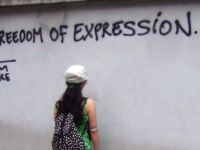Google has been in the spotlight for the past few weeks with reports that it has been testing removal news links from search results. The move sparked outrage from MPs, who grilled executives earlier today at Canadian Heritage committee. But now it appears Google has company: the Globe and Mail reports that Facebook has confirmed that it will remove news sharing from its platforms if Bill C-18 passes in its current form. The decision, which would affect Meta platforms Facebook and Instagram, should not come as a surprise since it warned that it was considering the possibility last fall. In fact, the case for Facebook blocking news sharing is even stronger than Google given that news constitutes only three percent of news feeds on the platform and the experience in Australia was that its removal had little impact on user engagement.
Post Tagged with: "c-18"
A Tax on Freedom Of Expression: Report Suggests Bill C-18 Could Be Expanded Even Beyond Mandated Payment for Links
Google was scheduled to appear before the Standing Committee on Canadian Heritage yesterday to discuss Bill C-18 and its test of the removal of links to Canadian news services for a small percentage of its users, but the meeting was postponed due to technical difficulties. That ensured that the big Bill C-18 news of the day did not come from the hearing, but rather from an exceptional Ricochet Media article featuring comments from Senator Paula Simons that should heighten concern about the government’s intent with Bill C-18. Senator Simons, a longtime journalist and Trudeau appointee to the Senate, raises many concerns with the bill (and a great line that “honest to god, I feel that this is written by people who have never used the Internet”), but I think this is the key passage, which opens the door to targets beyond Google and Facebook:
Then there’s the question of what would happen down the road if Google and Facebook were no longer profitable? Simons told Ricochet that when she raised that question with staff in the Heritage ministry, she was told they “would turn to TikTok.”“I said, ‘Wait a minute! TikTok doesn’t share news links,’” Simons recalled. “And staff said, ‘TikTok shares news stories in other ways. It talks about the news.’ I said, ‘Woah, wait a minute! That’s a fair-use argument.’…Then the official said to me, ‘Lots of Canadians get their news from TikTok.’” But, she pointed out, if a content creator on TikTok talks about something they read, that’s not the same as actually sharing a news story.
Bill C-18, Google and Mandated Payments for Links: My Appearance on CBC’s Power and Politics
As the Standing Committee on Canadian Heritage summoned Google to appear next week before committee (and implausibly provide all internal documentation related to Bill C-18 by tomorrow), media coverage of the bill and Google’s response has intensified. I was pleased to appear on CBC’s Power and Politics to discuss the the bill, Google’s response, and the implications of mandated payments for links that the government expects could fund 35% of news expenditures in all news outlets in Canada.
Why Justin Trudeau is Wrong About Bill C-18 and Google’s Response to Mandated Payments for Links
“It really surprises me that Google has decided that they would rather prevent Canadians from accessing news than actually paying journalists for the work they do. I think that’s a terrible mistake and I know that Canadians expect journalists to be well paid for the work they do.”
Prime Minister Justin Trudeau waded into Bill C-18 and Google removing links to Canadian news articles in search results as part of a test for a small percentage of users yesterday with the quote cited above. At a press conference in Toronto, Trudeau went out of his way to volunteer that he is surprised by Google’s actions, which he thinks is a “terrible mistake.” If Trudeau was surprised, then he has not been paying attention, as the possibility of removing links to news articles in search results or social media has been an obvious consequence of a bill that mandates payments for links. But his surprise isn’t what is important or requires comment. What does is that Trudeau’s comments mislead on several critical issues with Bill C-18.
The Bill C-18 Reality: Everyone Loses When the Government Mandates Payments for Links
The report that Google is conducting a national test that removes links to Canadian news sites for a small percentage of users sparked a predictable reaction as politicians who were warned that Bill C-18 could lead to this, now want to know how it could happen. None of this week’s developments should come as a surprise. Bill C-18 presents Google and Facebook with a choice: pay hundreds of millions of dollars primarily to Canadian broadcasters for links to news articles or stop linking. Both companies are doing precisely what they said they would do, namely considering stopping linking (Google conducted the same tests in Australia several years ago). Indeed, strip away the hyperbole and the bottom line is this: the costs of Bill C-18 are enormous (the government’s Senate representative suggesting the bill could result in revenues to cover 35% of news expenditures of every news outlet in Canada) and the revenues from news for the platforms are not (Facebook says news only constitutes 3 percent of posts and Google does not even run ads on its Google News product). As some have noted, the government says the companies are stealing content if they link and blocking content if they don’t.











